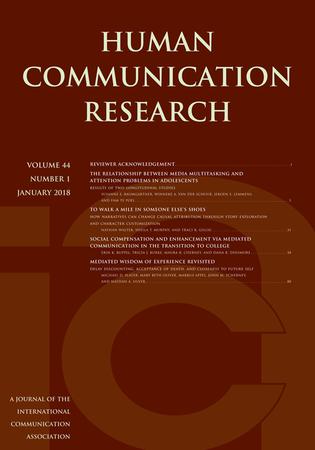Atoning vs. evading when caught transgressing: two multi-theory-based experiments investigating strategies for politicians responding to scandal
IF 3.3
1区 文学
Q1 COMMUNICATION
引用次数: 0
Abstract
Politicians tend to try deflecting scandals. Based on an attribution theory-driven perspective on persuasion, however, politicians should proactively confess. In a preregistered, multiple-message design, we conduct controlled, random assignment experiments. A mediation model is tested. Inspired by crisis communication’s change-of-meaning concept, the first variable appraises the extent to which voters perceive that the messaging indicates the politician is engaging in a cover-up. The second linkage is the politician’s credibility. The outcome variable is voters’ behavioral intentions. In Experiment 1 (N = 905 U.S. voters), stealing thunder and apologizing outperform stonewalling, changing the subject, sequentially apologizing plus deflecting, or silence. Experiment 2 (N = 277) finds that, in a sex scandal, stealing thunder and apologizing continue to perform equally well. Our theoretical contribution resides in enhancing the explanatory power of theories designed to explain image repair, as well as empirically testing the independent and combined role of apology and stealing thunder.被发现越轨时的 "赎罪 "与 "回避":两个基于多理论的实验,调查政治家应对丑闻的策略
政治家往往会试图回避丑闻。然而,基于归因理论驱动的说服视角,政治家应该主动坦白。在预先登记的多重信息设计中,我们进行了受控随机分配实验。对中介模型进行了测试。受危机公关的意义变化概念启发,第一个变量评估选民认为信息表明政治家正在进行掩盖的程度。第二个联系是政治家的可信度。结果变量是选民的行为意向。在实验 1(N = 905 名美国选民)中,抢风头和道歉的效果优于搪塞、转移话题、连续道歉加转移话题或沉默。实验 2(N = 277)发现,在性丑闻中,窃窃私语和道歉的表现仍然相同。我们的理论贡献在于提高了旨在解释形象修复的理论的解释力,并通过实证检验了道歉和 "窃听 "的独立作用和组合作用。
本文章由计算机程序翻译,如有差异,请以英文原文为准。
求助全文
约1分钟内获得全文
求助全文
来源期刊

Human Communication Research
COMMUNICATION-
CiteScore
8.20
自引率
2.00%
发文量
28
期刊介绍:
Human Communication Research is one of the official journals of the prestigious International Communication Association and concentrates on presenting the best empirical work in the area of human communication. It is a top-ranked communication studies journal and one of the top ten journals in the field of human communication. Major topic areas for the journal include language and social interaction, nonverbal communication, interpersonal communication, organizational communication and new technologies, mass communication, health communication, intercultural communication, and developmental issues in communication.
 求助内容:
求助内容: 应助结果提醒方式:
应助结果提醒方式:


